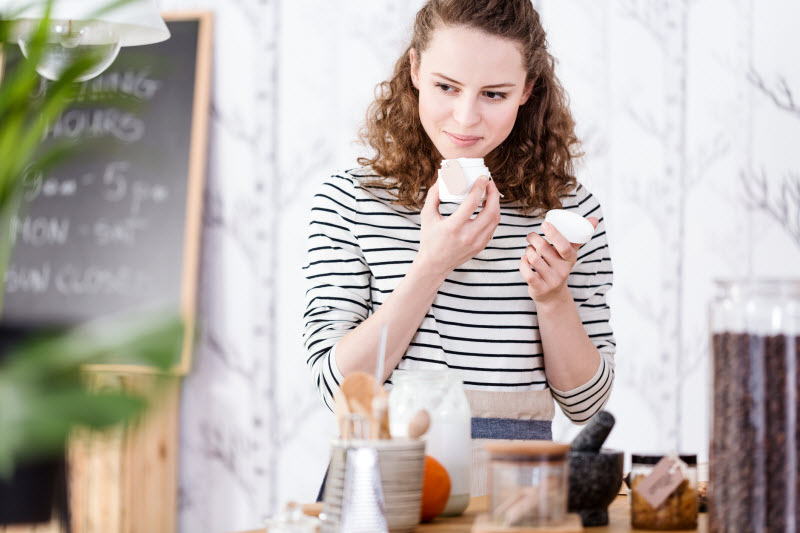What exactly is non-toxic beauty? Great question! It might be defined as an informed approach to personal care, where we seek out products that are free of potentially dangerous ingredients. A parallel is healthy eating, when we choose whole, natural foods over items laced with chemical additives. Both approaches minimize our intake of avoidable toxins, whether we consume them in meals, or absorb them through our skin.
However, while people tend to vary their diets, they frequently use the same personal care products daily. This increases our odds of bio-accumulating a variety of unhealthy chemicals, which are then stored in our fat, away from vital organs. It seems only logical that we would carefully consider what we apply to our bodies each day, especially as toxins enter the bloodstream though our skin.
We are wise indeed to question the safety of our personal care products, particularly because the conventional beauty industry is minimally regulated in the United States compared with European countries. Can we reasonably expect companies to remove specific chemicals from their products voluntarily when they are not legally required to do so?
Now for some good news! Due to consumer demand for safer products, many personal care brands have responded in recent years with healthy, effective alternatives to conventional products, in virtually every category. If you aspire to a safer beauty regimen, you can build it gradually, phasing in new items as you run out of the old. As you scan labels, here are a few ingredients to avoid, and why:
Parabens: Commonly used as preservatives, parabens have been linked to hormonal imbalances, early puberty in females and an increased risk of breast cancer.1
Phthalates: This common ingredient in perfume, nail polish, hair spray and other products has been linked to an increased risk of breast and prostate cancer.2
Benzophenone: Typically found in mass-market sunscreens, this chemical is associated with cellular damage and breast and ovarian cancers.3,4
Polyethylene glycols (PEGs): These petroleum-based chemicals, when improperly produced, can be contaminated by ethylene oxide and 1,4-dioxane, both of which are classified as known or possible human carcinogens.5
Sodium Lauryl Sulfate: This chemical, which creates lather in shampoo, bubble bath and other foaming products can irritate the eyes, skin, and lungs. It may also be contaminated with 1,4-dioxane, a known carcinogen.6
Triclosan: This antimicrobial is so common that 75 percent of Americans are exposed to it through antibacterial soap, deodorant and toothpaste, even though it has been linked to cytotoxic, genotoxic and endocrine disruptor effects.7
Retinyl Palmitate: Widely used in commercial sunscreens, skincare products, lipstick and lotion, this chemical, in the presence of sunlight, may accelerate the growth of cancerous tumors.8
Synthetic Fragrances: The International Fragrance Association lists 3,059 materials used in fragrance compounds, a number of which are linked to reproductive toxicity, allergies, skin sensitivities, and cancer.9
Non toxic skin care & non toxic makeup brands
When you are ready to upgrade to some safe new products, here are just a few of the many brands that typically exclude hazardous additives:
- Alba: Safe personal care products for the whole family.
- MyChelle: Sunscreen, facial care, cosmetics and more.
- Andalou Naturals: Sunscreen, deodorant, facial and hair care, etc.
- Pacifica Natural Beauty: Cosmetics, nail polish, fragrance, facial care, etc.
- Love Beauty and Planet: Body wash, skin care, hair care, fragrances.
- Green Goo Bath gels and salts, salves, soaps and balms.
- Aubrey Naturals: personal care products in all basic categories for both men and women.
- Earth Therapeutics: Bath products, exfoliating brushes and tools, foot care, massage lotions, sponges, etc.
- Vitacost: best source for affordable, high-quality skincare solutions and essential oils.
Given this information, you may even feel inclined to treat yourself or those you love to some beautifully safe personal care products this month. Healthy beauty essentials make a splendid gift indeed. Cheers!
References:
1https://pubmed.ncbi.nlm.nih.gov/32623858/
2https://pubmed.ncbi.nlm.nih.gov/30125794/
3https://pubmed.ncbi.nlm.nih.gov/25849766/
4https://pubmed.ncbi.nlm.nih.gov/23328252/
5https://davidsuzuki.org/queen-of-green/dirty-dozen-peg-compounds-contaminants/
6 https://www.healthline.com/health/beauty-skin-care/what-is-sodium-lauryl-sulfate#takeaway
7https://pubmed.ncbi.nlm.nih.gov/22057832/
8https://pubmed.ncbi.nlm.nih.gov/28130778/
9http://www.safecosmetics.org/get-the-facts/chemicals-of-concern/fragrance/

